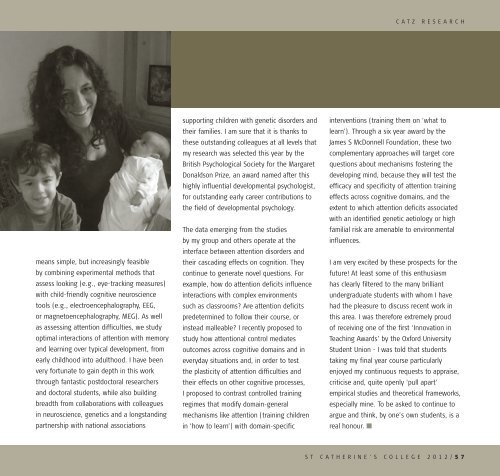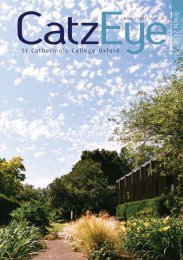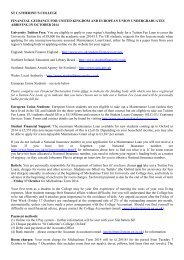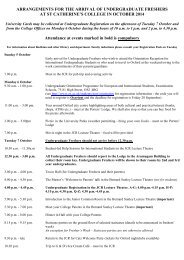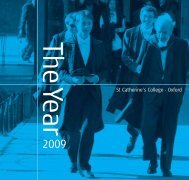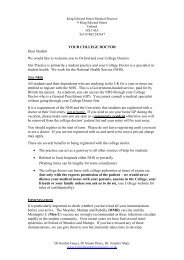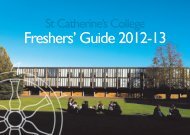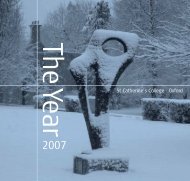Download PDF - St. Catherine's College - University of Oxford
Download PDF - St. Catherine's College - University of Oxford
Download PDF - St. Catherine's College - University of Oxford
You also want an ePaper? Increase the reach of your titles
YUMPU automatically turns print PDFs into web optimized ePapers that Google loves.
CATZ RESEARCH<br />
means simple, but increasingly feasible<br />
by combining experimental methods that<br />
assess looking (e.g., eye-tracking measures)<br />
with child-friendly cognitive neuroscience<br />
tools (e.g., electroencephalography, EEG,<br />
or magnetoencephalography, MEG). As well<br />
as assessing attention difficulties, we study<br />
optimal interactions <strong>of</strong> attention with memory<br />
and learning over typical development, from<br />
early childhood into adulthood. I have been<br />
very fortunate to gain depth in this work<br />
through fantastic postdoctoral researchers<br />
and doctoral students, while also building<br />
breadth from collaborations with colleagues<br />
in neuroscience, genetics and a longstanding<br />
partnership with national associations<br />
supporting children with genetic disorders and<br />
their families. I am sure that it is thanks to<br />
these outstanding colleagues at all levels that<br />
my research was selected this year by the<br />
British Psychological Society for the Margaret<br />
Donaldson Prize, an award named after this<br />
highly influential developmental psychologist,<br />
for outstanding early career contributions to<br />
the field <strong>of</strong> developmental psychology.<br />
The data emerging from the studies<br />
by my group and others operate at the<br />
interface between attention disorders and<br />
their cascading effects on cognition. They<br />
continue to generate novel questions. For<br />
example, how do attention deficits influence<br />
interactions with complex environments<br />
such as classrooms? Are attention deficits<br />
predetermined to follow their course, or<br />
instead malleable? I recently proposed to<br />
study how attentional control mediates<br />
outcomes across cognitive domains and in<br />
everyday situations and, in order to test<br />
the plasticity <strong>of</strong> attention difficulties and<br />
their effects on other cognitive processes,<br />
I proposed to contrast controlled training<br />
regimes that modify domain-general<br />
mechanisms like attention (training children<br />
in ‘how to learn’) with domain-specific<br />
interventions (training them on ‘what to<br />
learn’). Through a six year award by the<br />
James S McDonnell Foundation, these two<br />
complementary approaches will target core<br />
questions about mechanisms fostering the<br />
developing mind, because they will test the<br />
efficacy and specificity <strong>of</strong> attention training<br />
effects across cognitive domains, and the<br />
extent to which attention deficits associated<br />
with an identified genetic aetiology or high<br />
familial risk are amenable to environmental<br />
influences.<br />
I am very excited by these prospects for the<br />
future! At least some <strong>of</strong> this enthusiasm<br />
has clearly filtered to the many brilliant<br />
undergraduate students with whom I have<br />
had the pleasure to discuss recent work in<br />
this area. I was therefore extremely proud<br />
<strong>of</strong> receiving one <strong>of</strong> the first ‘Innovation in<br />
Teaching Awards’ by the <strong>Oxford</strong> <strong>University</strong><br />
<strong>St</strong>udent Union - I was told that students<br />
taking my final year course particularly<br />
enjoyed my continuous requests to appraise,<br />
criticise and, quite openly ‘pull apart’<br />
empirical studies and theoretical frameworks,<br />
especially mine. To be asked to continue to<br />
argue and think, by one’s own students, is a<br />
real honour. n<br />
ST CATHERINE’S COLLEGE 2012/57


